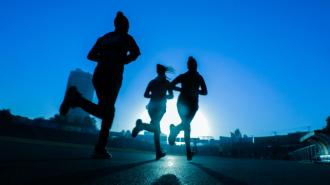key part of starting to exercise is choosing when to work out. Morning, afternoon, or evening: Which time is best? Scientists have studied this dilemma extensively.
Rise and shine at 5 a.m.?
For novice exercisers, morning workouts are often the most dreaded. Trading a cozy, nurturing bed for a sterile, unforgiving fitness center can be a rude awakening to say the least. But morning workouts have their advantages. Challenging the body triggers the release of endorphins, uplifting one’s mood following exertion. These chemicals, along with a few others, boost energy levels, alertness, and focus, which can make you more productive and attentive at work.
Moreover, for those who struggle to fall asleep at night, habitual morning exercise may help to reset their circadian rhythms, the internal, biological processes that regulate the 24-hour sleep-wake cycle. While early workouts could be a struggle for night owls to grow accustomed to, sticking with them could make these individuals more alert in the morning and more tired at night, hopefully resulting in more sleep and improved health outcomes.
You are stronger in the afternoon
But alas, early exercisers may not be able to achieve peak performance. Stiffer muscles, fewer stored energy reserves from overnight fasting, and a slightly cooler body temperature in the morning add up to hamper exercise output. Therefore, more avid exercisers might prefer working out in the afternoon.
“The best window for explosive athleticism seems to be between 1 p.m. and 6 p.m.” Shawn Arent, chair of the Department of Exercise Science at the University of South Carolina told CNN.
For example, in one study, young men instructed to cycle to exhaustion at a set difficulty were able to ride 20% longer in the afternoon compared to the morning. A review of studies also found that muscle strength, muscle power, and sprinting abilities all peaked in the afternoon, topping morning performance by anywhere from 3% to 20%.
Exercise itself may also be more efficient in the afternoon. A small, 12-week study focusing on pre-diabetic and diabetic men found that afternoon training produced slightly more beneficial metabolic effects and resulted in a little more fat loss compared to morning training. The advantages, however, were marginal.
Exercise for night owls
Finally, some folks may decide to work out later in the evening. Studies centered around this time of day tend to focus on whether or not nightly exercise negatively impacts sleep quality. Gathered research suggests it does not and, instead, actually improves sleep. This finding comes with a big asterisk, however. Intense exercise performed within an hour of one’s bedtime absolutely will make it more difficult to fall asleep. For this reason, most exercise experts recommend at least 90 minutes of downtime between the conclusion of an exercise session and attempting to fall asleep.
Be consistent
Whether morning, afternoon, or evening, it is optimal if exercise timing remains somewhat consistent, research has found.
“For example, a competitive marathon runner will exhibit the best performance when his/her exercise training sessions occur at the same time-of-day as the marathon. Circadian biology may underpin this observation, including diurnal variations in body temperature, substrate metabolism, neuromuscular function, and hormones,” researchers from the University of Utah wrote last year in a study published to the journal PLoS ONE.
Still, it is perfectly fine to mix up your workout times to fit with your schedule. The average person need not worry over when to work out just because of some slight bodily differences based on time-of-day. Regular exercise is, after all, perhaps the single best thing that humans can do for their health, and ideally, it should serve as stress relief rather than something to stress over.
So, taking everything into account, when is the best time to exercise? There actually is a straightforward answer! If you’re not about to go to sleep, if you’ve got some free time on your hands, and if you haven’t already exercised today, the best time to exercise is now.
This article was reprinted with permission of Big Think, where it was originally published.
